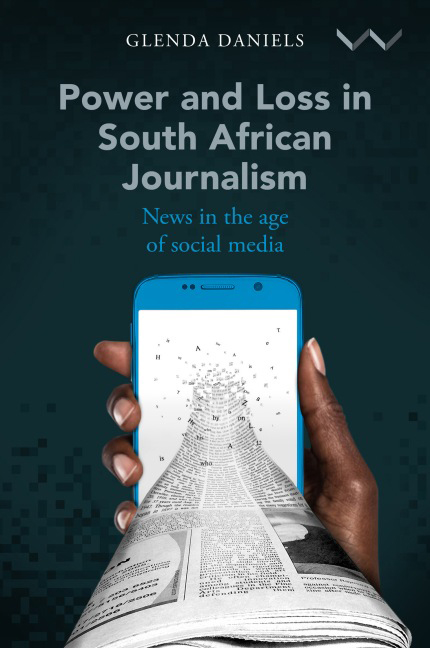Book contents
- Frontmatter
- Dedication
- Contents
- Tables and Figures
- Preface
- Acknowledgements
- Acronyms and Abbreviations
- 1 Power and Subjection in the Media Landscape
- 2 The Media, the State and Zuma’s ANC
- 3 ‘Zupta’: Power and Loss in Investigative Journalism
- 4 The Job Loss Tsunami
- 5 Going Online When You’re Offline: The Case of Community Media
- 6 The Anti-Feminist Backlash, the Glass Ceiling and Online Trolls
- 7 Decolonial ‘Green Shoots’
- 8 Power, Loss and Reimagining Journalism
- Epilogue
- Appendices
- Appendix A Press Code of Ethics and Conduct for South African Print and Online Media (effective from 1 January 2016)
- Appendix B amaBhungane Stories in the Past Two or Three Years
- Notes
- Glossary
- Bibliography
- Index
5 - Going Online When You’re Offline: The Case of Community Media
Published online by Cambridge University Press: 10 September 2020
- Frontmatter
- Dedication
- Contents
- Tables and Figures
- Preface
- Acknowledgements
- Acronyms and Abbreviations
- 1 Power and Subjection in the Media Landscape
- 2 The Media, the State and Zuma’s ANC
- 3 ‘Zupta’: Power and Loss in Investigative Journalism
- 4 The Job Loss Tsunami
- 5 Going Online When You’re Offline: The Case of Community Media
- 6 The Anti-Feminist Backlash, the Glass Ceiling and Online Trolls
- 7 Decolonial ‘Green Shoots’
- 8 Power, Loss and Reimagining Journalism
- Epilogue
- Appendices
- Appendix A Press Code of Ethics and Conduct for South African Print and Online Media (effective from 1 January 2016)
- Appendix B amaBhungane Stories in the Past Two or Three Years
- Notes
- Glossary
- Bibliography
- Index
Summary
Who we are, and from where we speak.
Paula Moya, ‘Who We Are, and from Where We Speak’More than half of all South Africa's community newspapers have closed, without any mention in the mainstream media or any other form of acknowledgement. It seems like no one knew and no one cared, and it was a case of ‘you don't know what you have until it's gone’. The constant closures of community newspapers did not happen in one gigantic tsunami wave, but in incremental choppy ones. The newspapers have been going online but not in a way that advances the interests of communities. The loss of community media speaks directly to the marginalisation of the poor, which is central to decolonial theory.
The Media Development and Diversity Agency (MDDA)defines community media as any media project that is owned and controlled by a community where any financial surplus generated is reinvested in the media project. ‘Community’ means a geographically founded community or any group of persons or sector of the public having a specific ascertainable common interest. This definition, together with that of the Association of Independent Publishers (AIP) that identifies community media as ‘publications that are locally owned in publication and distribution’ is used here. Geographically, the newspapers are spread across the country. Most of the community newspapers are published in the big cities – Johannesburg, Pretoria, Durban and Cape Town. The community newspapers in this research do not include knock-and-drops (with more advertising than editorial pages) owned by corporates, and dominated by Caxton, but are the ‘real independents’ as described by the AIP.
In her seminal work of 1988, Can the Subaltern Speak?, the postcolonial theorist Gayatri Spivak asked whether intellectuals and ruling elites were going to continually speak for the subaltern, without acknowledging that knowledge is never completely known or complete. In the same politico-philosophical borrowing, my research examines the demise of print community media and the shift to online from what is left of the sector.
We cannot completely escape our location in power structures (for example, racial hierarchies) and our knowledges, too, are situated. Hence the importance of the decolonial turn, a term we owe to Frantz Fanon and Aimé Césaire that refers to a shift in knowledge production, but is also more than this: it is an attitude that demands responsibility and willingness to take on the injustice of the hierarchies.
- Type
- Chapter
- Information
- Power and Loss in South African JournalismNews in the Age of Social Media, pp. 87 - 106Publisher: Wits University PressPrint publication year: 2020

